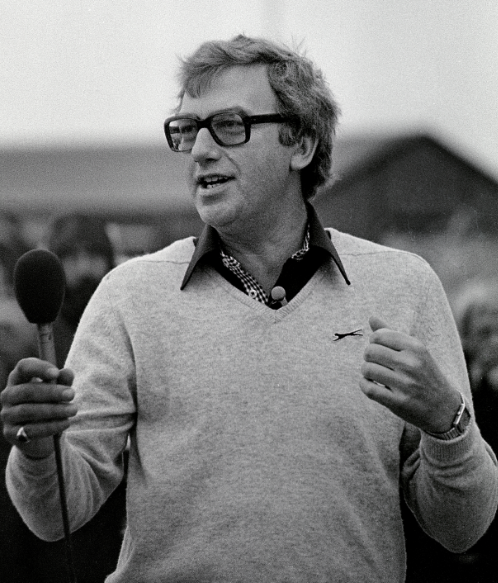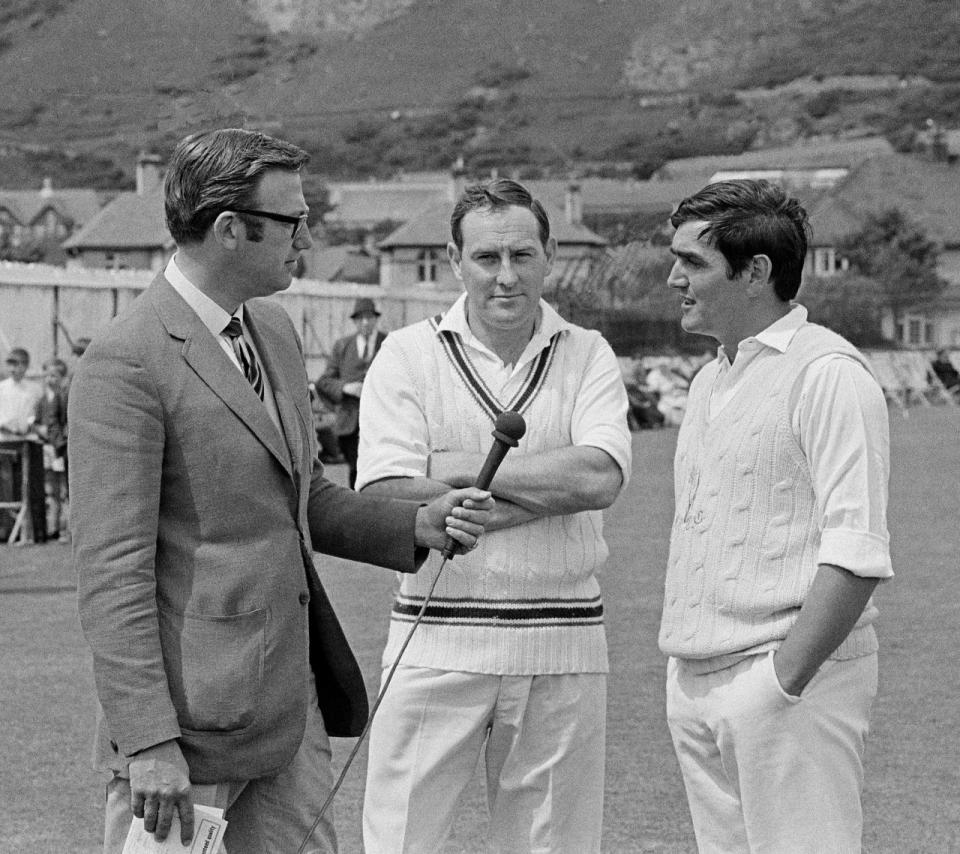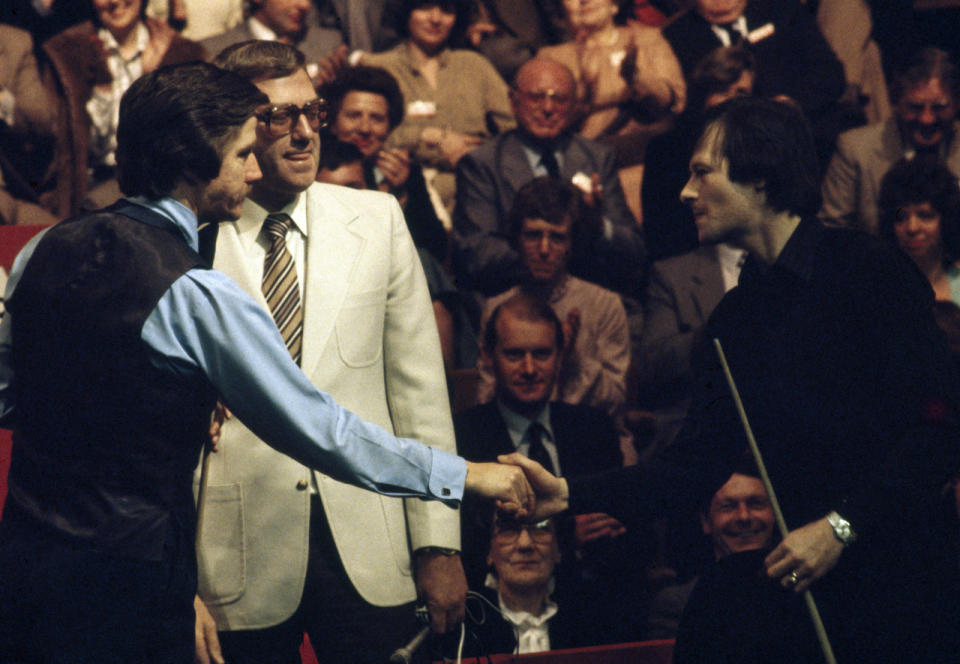Voices of Sport: David Vine - The great BBC all-rounder that became synonymous with skiing and snooker
In our weekly series, Yahoo Sport’s Nick Metcalfe features a famous voice of sport. This week, the BBC presenter and commentator David Vine goes under the spotlight.

‘It’s wages time’
In my first two ‘Voices of Sport’ features I profiled two famous names associated with a single sport - Brian Moore with football and Richie Benaud with cricket - but this week comes the first of the many versatile presenters and commentators we’ve come to know over the decades.
David Vine was a familiar face and voice to us for generations, working on a host of programmes and sports, but he was probably most associated with skiing and snooker.
Like many broadcasters, Vine actually began in newspapers and was sports editor of the Western Morning News in Plymouth.
But it wasn’t long before TV came calling, first with the ITV regional company Westward Television, and then from 1966 with the BBC.
Vine was an early presenter of the magazine show Sportscene, and a reporter on Rugby Special. He presented the nightly highlights programme during Wimbledon, once memorably asking John McEnroe, ‘what right have you got to call anyone an incompetent fool?’ after a typical tirade against an umpire from the American.
Vine also fronted the BBC’s show jumping coverage, at a time when that sport was rather a big deal. He was the first presenter of the popular quiz show A Question of Sport, and was occasionally the anchorman for Grandstand and Match of the Day. He even dipped his toes into light entertainment, presenting It’s a Knockout and Miss World. Basically, there wasn’t much that Vine didn’t do. Truly, Mr Versatile.

He became a very familiar face for viewers, establishing himself as an unflappable professional, who oozed natural authority and gravitas on screen.
However, Vine probably didn’t have a sport or event that became his trademark. Until Ski Sunday and snooker came along, that is.
British viewers loved watching skiing at the Winter Olympics. The 1976 Games in Innsbruck went down very well indeed, particularly when Austria’s Franz Klammer produced a masterful performance to win gold in the men’s downhill.
Television executives believed there was scope for a weekly programme dedicated to the sport. It was an inspired move, with Ski Sunday brought to our screens in 1978 and millions soon making it appointment viewing at the end of their weekends.
In the eyes of the viewers, Vine pretty much was Ski Sunday. He welcomed us to that week’s programme. He commentated on the feature races. He did the interviews afterwards. He said goodbye at the end.
Vine’s voice and delivery were tailor-made for the sport, as this clip from 1981 illustrates perfectly. Britain’s Konrad Bartelski produced an incredible performance to finish second in a World Cup downhill race at Val Gardena, and Vine captured the moment superbly.
“And Konrad Bartselski of Great Britain is second in a World Cup race. My goodness me, have we ever seen anything like that? For year’s he’s promised so much. Suddenly here, on one of the most difficult hills of all time, look at that. And we’ll all cheer with him. He could have won it, one small mistake. The day it all came right for Konrad Bartelski and Great Britain. There’s never been a result like that in British skiing. Unbelievable. The race we thought was all over, and suddenly the Union Jack came down the hill like a rocket. Well that will warm you up back at home won’t it? Never mind about the snow drifts, stand up and cheer.”
Those were the days when it really meant something to talk about the viewers back at home. We certainly didn’t take annual skiing breaks ourselves back then. The chances are we would go away once a year if we were lucky.
There was something of the exotic, in a snowy sense, about Ski Sunday, as it took us away from a cold dark evening in Britain to some glamorous resort in mainland Europe.
There was something about the audio quality of the commentaries too. I wouldn’t go as far as suggesting they were akin to the phone lines of the Mexico World Cup of 1970, but there was hardly an ISDN type clarity either. It meant the broadcasts sounded very real, and are now highly evocative.
Vine became totally synonymous with the sport in Britain, working on Ski Sunday for 18 years and describing the action at every Winter Olympics of the time.
But the late 1970s, 1980s and beyond weren’t just about skiing for Vine. He also came to be associated with a very different kind of TV sport, snooker.

The popular table game enjoyed massively increased TV coverage in the late 1970s, particularly at the annual World Championship, which moved to Sheffield’s Crucible Theatre in 1977.
And Vine was the man that fronted the majority of the coverage. In fact, he hardly seemed to be off our screens for those 17 days, presenting coverage morning, noon and night from his Sheffield bunker.
As far as snooker fans were concerned, we had never had it so good. These were halcyon days for the sport. The players became huge national celebrities. There was ‘The Hurricane’ Alex Higgins, 'The Whirlwind’ Jimmy White, and 'The Grinder’ Cliff Thorburn. And of course the man that pretty much won everything at the time, Steve Davis.
In his own way, Vine was just as big. He was an intrinsic part of snooker too. The Devonian genuinely did love the sport, and that shone through. He emanated warmth to the viewer during those long days and nights on the baize.
Vine was famous for entering the inner sanctum of the Crucible after big matches had finished, usually the final, with microphone in hand. His 'it’s wages time’ line at the end of the tournament became a catchphrase of sorts. And some of the answers he received from players over the years are part of snooker folklore.
Terry Griffiths and his understated ‘I’m in the final now, you know’ after overcoming Eddie Charlton in a marathon 1979 semi-final. Davis and his 'it happened in black and white’ after his amazing 1985 black ball defeat to Dennis Taylor. White with 'he’s beginning to annoy me now’ after his nemesis Stephen Hendry claimed a final frame decider in 1994.
Vine had truly found another natural home with snooker. If you wanted someone to anchor many hours of coverage, and do it in a measured and precise fashion, who else would you want?
If ‘Whispering’ Ted Lowe will always be known as the voice of snooker, Vine will surely long be remembered as the face of the sport.
In keeping with the tag of ‘Mr Versatile’, Vine also had another regular gig during this time, describing weightlifting at the Olympics. Naturally, he did that brilliantly too. Vine covered the sport at the Games for decades, right up until his last major work for the BBC, in Sydney in 2000.
It’s fair to suggest nearly everything about Vine was old school. Towards the end of his life, he was critical of the BBC’s decision to lessen the role of snooker commentator Clive Everton. 'The trend is for celebrities, former players and star names to be invited to the job of professional journalists and trained broadcasters,’ he lamented.
Vine, who had triple bypass surgery in 2001, died of a heart attack at the age of 73 in 2009. Not surprisingly, the tributes were fulsome in their praise.
My favourite probably came from snooker’s Griffiths. The Welshman said: ‘David had that wonderful voice that gave you the feeling that if you were in fog it would come through.’
There were so many outstanding broadcasters in Vine’s time, and he deserves to be placed in the top bracket. Millions of sports lovers will remember him with affection.


